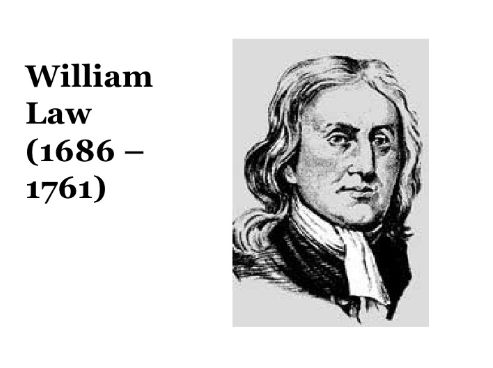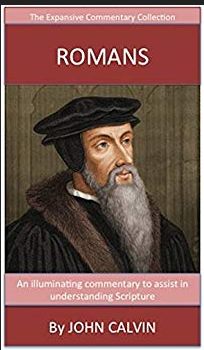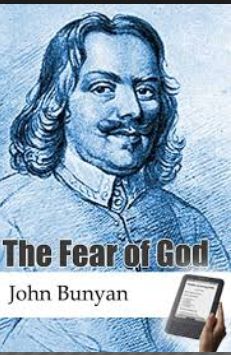
Law, William – Sermons
WLue777
- 0
WP_Post Object
(
[ID] => 1186
[post_author] => 2
[post_date] => 2024-02-19 14:35:00
[post_date_gmt] => 2024-02-19 20:35:00
[post_content] => Sermons by William Law
William Law (1686 – 9 April 1761) was a Church of England priest who lost his position at Emmanuel College, Cambridge when his conscience would not allow him to take the required oath of allegiance to the first Hanoverian monarch, King George I. Previously William Law had given his allegiance to the House of Stuart and is sometimes considered a second-generation non-juror (an earlier generation of non-jurors included Thomas Ken). Thereafter, Law first continued as a simple priest (curate) and when that too became impossible without the required oath, Law taught privately, as well as wrote extensively.
His personal integrity, as well as his mystic and theological writing greatly influenced the evangelical movement of his day as well as Enlightenment thinkers such as the writer Dr Samuel Johnson and the historian Edward Gibbon. In 1784 William Wilberforce (1759-1833), the politician, philanthropist and leader of the movement to stop the slave trade, was deeply touched by reading William Law's book A Serious Call to a Devout and Holy Life (1729).[1] Law's spiritual writings remain in print today.
Wikipedia.org
Download
[download id="5842"]
More Posts from the Sermons Category
[catlist name="sermons"]
[post_title] => Law, William - Sermons
[post_excerpt] =>
[post_status] => publish
[comment_status] => closed
[ping_status] => closed
[post_password] =>
[post_name] => law-william-sermons
[to_ping] =>
[pinged] =>
[post_modified] => 2023-11-07 16:45:05
[post_modified_gmt] => 2023-11-07 22:45:05
[post_content_filtered] =>
[post_parent] => 0
[guid] => http://www.theword-commentary-modules.com/?p=1186
[menu_order] => 0
[post_type] => post
[post_mime_type] =>
[comment_count] => 0
[filter] => raw
)
Sermons by William Law
William Law (1686 – 9 April 1761) was a Church of England priest who lost his position at Emmanuel College, Cambridge when his conscience would not allow him to take the required oath of allegiance to the first Hanoverian monarch, King George I. Previously William Law had given his allegiance to the House of Stuart and is sometimes considered a second-generation non-juror (an earlier generation of non-jurors included Thomas Ken). Thereafter, Law first continued as a simple priest (curate) and when that too became impossible without the required oath, Law taught privately, as well as wrote extensively.
His personal integrity, as well as his mystic and theological writing greatly influenced the evangelical movement of his day as well as Enlightenment thinkers such as the writer Dr Samuel Johnson and the historian Edward Gibbon. In 1784 William Wilberforce (1759-1833), the politician, philanthropist and leader of the movement to stop the slave trade, was deeply touched by reading William Law’s book A Serious Call to a Devout and Holy Life (1729).[1] Law’s spiritual writings remain in print today.
Download
Download “Law-Henry-Sermons.gbk.twm” Law-Henry-Sermons.gbk.twm – Downloaded 60 times – 764.00 KBMore Posts from the Sermons Category
- Alexander Sermons
- Bunyan, John – Sermons and Allegories
- Chappell, Clovis G. – Sermons on the Psalms
- Davies, Samuel-Sermons
- Law, William – Sermons
- Luther, Martin – Sermons
- Manton, Thomas – The Lord’s Prayer
- Manton, Thomas Coming of Christ
- Sermons by Archibald Brown
- Sermons of George Mylne

Ritchie Foundational Truths of the Gospel is a basic doctrinal treatise for Assurance, Conversion, Eternal Life, Judgment, Justification, Perfection, Regeneration, Salvation, Sanctification, and Separation.
PDF:Ritchie Foundational Truths of the Gospel
theWord:Ritchie Foundational Truths of the Gospel
eSword:Ritchie Foundational Truths of the Gospel
MySword:Ritchie Foundational Truths of the Gospel
Advertisement
In the classtheWord Bible Bookmarks we review how to open and close the Bible bookmarks bar, and how to use it.

